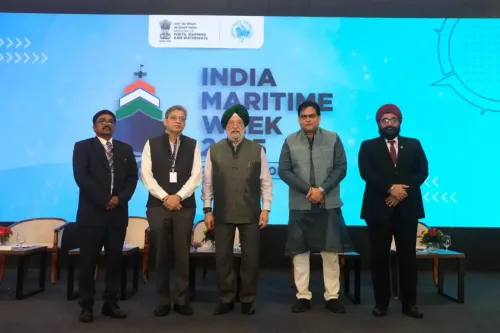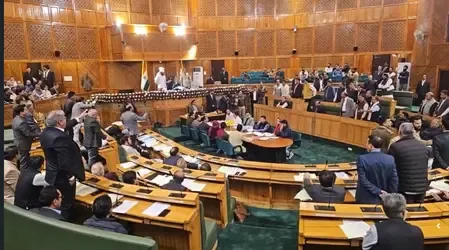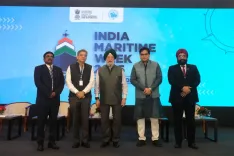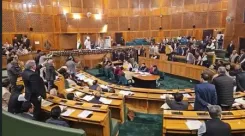How is Shubhanshu Shukla’s mission fueling the ambition for Viksit Bharat by 2047?
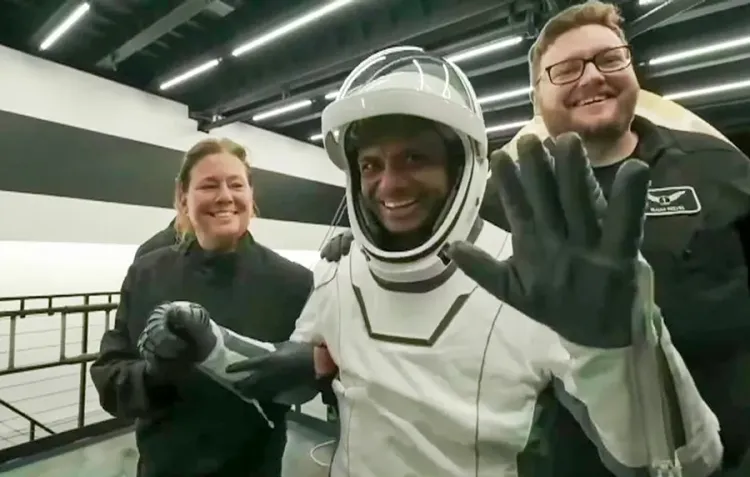
Synopsis
Key Takeaways
- Shubhanshu Shukla is the first Indian to reach the ISS.
- The mission aims to inspire youth towards scientific careers.
- It marks a significant step towards Viksit Bharat by 2047.
- Groundbreaking experiments conducted in microgravity.
- Shukla is the youngest astronaut under the Gaganyaan mission.
New Delhi, July 16 (NationPress) Shubhanshu Shukla’s mission ignites the nation's determination to create Viksit Bharat by 2047, the Cabinet declared on Wednesday, while passing a resolution commending his remarkable space journey.
IAF Group Captain Shukla, who marked a monumental achievement on June 26 as the first Indian to reach the International Space Station (ISS), successfully returned to Earth on Tuesday.
“The Cabinet joins the nation in celebrating the return of Group Captain Shubhanshu Shukla to Earth, after the successful completion of his historic 18-day mission aboard the ISS,” a Cabinet Communique stated.
“This milestone will ignite scientific curiosity, inspire the youth to pursue careers in science, and drive innovation.
“The Cabinet reaffirms its unwavering belief that this mission will energize the national resolve to construct Viksit Bharat -- a developed India -- by 2047, as envisioned by the Prime Minister,” the Communique further added.
Shukla, part of the Axiom Space mission 4, safely returned on Tuesday with fellow astronauts from the US, Poland, and Hungary aboard SpaceX’s Dragon spacecraft named Grace.
The IAF officer stands as the youngest astronaut-designate under India's Gaganyaan mission -- the nation’s inaugural human spaceflight initiative.
His space expedition and the experiments carried out onboard the ISS are anticipated to be a crucial stepping-stone for India’s Gaganyaan human spaceflight mission, slated for 2027.
Chaired by Prime Minister Narendra Modi, the Cabinet noted that Shukla’s “space journey signifies the infinite aspirations of India. This is a moment of pride, glory, and joy for the entire nation”.
“It marks a new chapter in India’s space program and offers a promising glimpse into our future endeavors in space,” it stated.
The Cabinet also praised ISRO and the entire community of scientists and engineers behind the success of Shukla’s mission.
While aboard the ISS, Group Captain Shukla collaborated effectively with fellow members of the Axiom-4 Crew and Expedition 73, showcasing India’s growing leadership in international space collaboration.
He conducted groundbreaking experiments in microgravity on topics such as muscle regeneration, algal and microbial growth, crop viability, microbial survivability, cognitive performance in space, and the behavior of cyanobacteria.
“These studies will enhance global understanding of human spaceflight and microgravity science, providing essential inputs for India’s upcoming missions,” the Cabinet remarked.
“This successful mission significantly elevates India’s global standing in space exploration. It serves as an essential stepping-stone toward India’s human spaceflight ambitions, including Gaganyaan and the Bharatiya Antariksha Station. It reaffirms India’s commitment to leading in human space exploration,” it added.
The Cabinet also recognized other recent landmark achievements in the space sector, including the historic landing of Chandrayaan-3 near the Moon's South Pole in August 2023 and the launch of the Aditya-L1 Mission in 2023.
“Through sustained reforms in the space sector, the Government has unlocked remarkable growth in India’s space economy. The emergence of around 300 new start-ups in this sector has not only created job opportunities on a large scale but has also fostered a vibrant ecosystem of innovation, entrepreneurship, and technology-driven development,” the Cabinet concluded.



